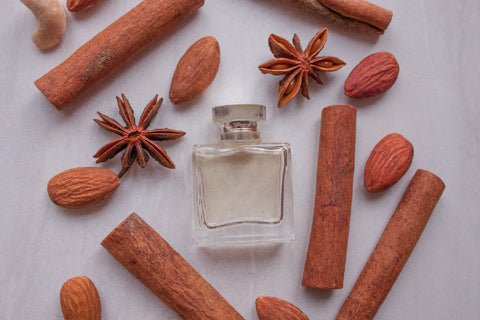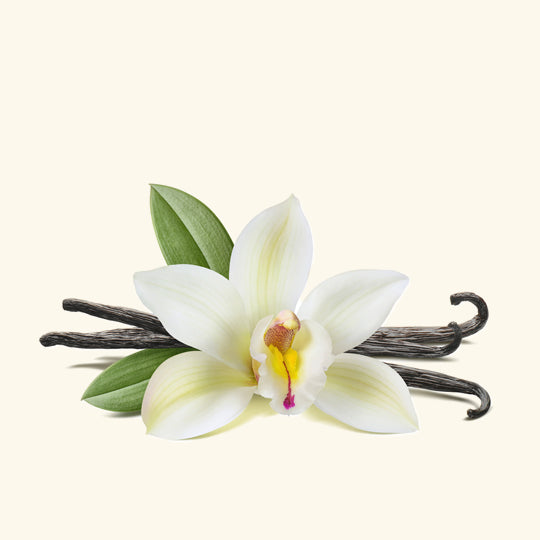What Are Fragrance Notes?
The distinct aromas that make up a perfume or cologne are known as fragrance notes. Typically, there are three types of notes: top notes (episodes that quickly fade), middle notes (the essence of the smell), and base notes (long-lasting scents). The combination of these notes yields the overall aroma profile.

About Perfume Making - Perfume is made by mixing fragrant essential oils with alcohol and water, and then allowing the mixture to age and blend together over time.
Different Notes in Perfume Making:
- Top Notes: initial scents that are usually citrus or floral, and evaporate quickly.
- Middle Notes: The heart of the fragrance, consisting of floral, fruity, or spicy scents.
- Base Notes: long-lasting scents such as musk, vanilla, or sandalwood, that provide depth and complexity to the fragrance.
About Middle Notes Fragrances - A fragrance's middle notes, which include aromas like floral, fruity, or spicy undertones and add character and depth, comprise its core.
What Are Middle Notes In Perfume?
Middle notes, also known as heart notes, are the second set of scents that are detected in a perfume. They typically emerge 15-30 minutes after application and are the main body of the fragrance. They usually consist of floral, spicy, or fruity scents that complement the top notes and prepare the way for the base notes.
Top 10 Middle Notes List For Perfume Making
The various natural and organic products that we are blessed with that have middle notes fragrances are:
-
Cinnamon Note - Cinnamon note fragrance is a warm, spicy scent that is derived from the bark of the cinnamon tree. It is commonly used in perfumes, candles, and other personal care products due to its comforting and invigorating properties. The fragrance is often described as sweet, woody, and slightly floral.

- Clary Sage Note - Clary sage note fragrance is an herbal, slightly sweet scent that is derived from the clary sage plant. It is commonly used in perfumes and other personal care products due to its calming and uplifting properties. The fragrance is often described as earthy, musky, and slightly floral.
-
Clove Note - Clove note fragrance is a warm, spicy scent that is derived from the clove bud. It is commonly used in perfumes and other personal care products due to its stimulating and energizing properties. The fragrance is often described as sweet, woody, and slightly floral.

- Cardamom Note - Cardamom note fragrance is a warm, spicy scent that is derived from the cardamom seed. It is commonly used in perfumes and other personal care products due to its invigorating and energizing properties. The fragrance is often described as sweet, woody, and slightly floral with a hint of citrus.
- Geranium Note - Geranium note fragrance is a floral, slightly sweet scent that is derived from the geranium plant. It is commonly used in perfumes and other personal care products due to its balancing and soothing properties. The fragrance is often described as rosy, citrusy, and slightly minty.
- Ginger Note - Ginger note fragrance is a warm, spicy scent that is derived from ginger root. It is commonly used in perfumes and other personal care products due to its energizing and invigorating properties. The fragrance is often described as spicy, woody, and slightly floral with a hint of citrus.
-
Jasmine Note - Jasmine note fragrance is a rich, floral scent that is derived from the jasmine flower. It is commonly used in perfumes and other personal care products due to its sensual and relaxing properties. The fragrance is often described as sweet, exotic, and slightly musky.

- Lavender Note - Lavender note fragrance is a floral, slightly herbaceous scent that is derived from the lavender plant. It is commonly used in perfumes and other personal care products due to its calming and soothing properties. The fragrance is often described as fresh, clean, and slightly powdery.
- Lotus Note - Lotus note fragrance is a sweet, floral scent that is derived from the lotus flower. It is commonly used in perfumes and other personal care products due to its relaxing and uplifting properties. The fragrance is often described as aquatic, fruity, and slightly powdery.
- Rose Note - Rose note fragrance is a classic, romantic scent that is derived from the rose flower. It is commonly used in perfumes and other personal care products due to its calming and balancing properties. The fragrance is often described as sweet, floral, and slightly spicy.
How Long Do Middle Notes in Perfume Last?
Middle notes, also known as heart notes, typically last between 3 to 5 hours in a perfume. They emerge 15-30 minutes after application and are the main body of the fragrance. The longevity of the middle notes may vary depending on the individual's body chemistry, The fragrance's composition, and the concentration of the perfume.
Conclusion
Middle note fragrances, also known as heart notes, are an essential part of a perfume's composition. They form the main body of the fragrance and are responsible for its overall character and personality. Middle notes typically last between 3 to 5 hours in perfume and are usually composed of floral, fruity, and spicy scents. The longevity of the middle notes may vary depending on the individual's body chemistry, the fragrance's composition, and the concentration of the perfume.
You May Also Like:
- Top 10 Fragrance Oils for Candle Making 2025 - Make Scented Candles
- Fragrance Oils vs Essential Oils - Who's Winner?
- Fragrance Oils for Incense Sticks | Best Smelling Agarbatti in India
- Minty Essential Oils | Best Minty Fragrance Essential Oils
- Frankincense Oil For Skin Care : Younger & Healthy Skin













 Sign in
Sign in Register now
Register now My Reward Points
My Reward Points









